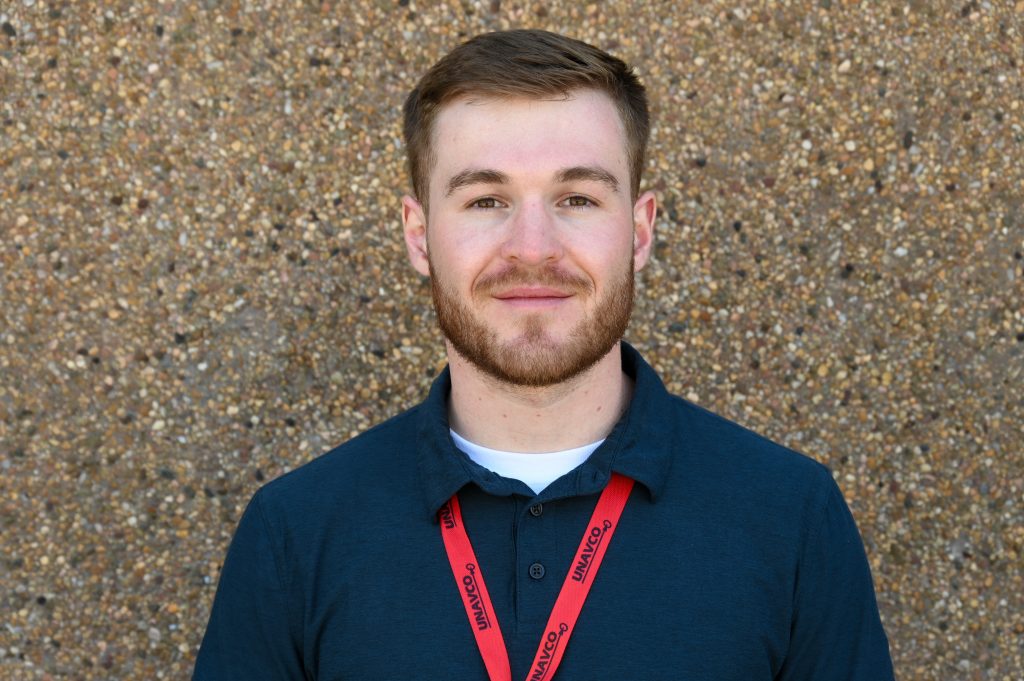
2021 Geo-Launchpad Intern Patrick Walston 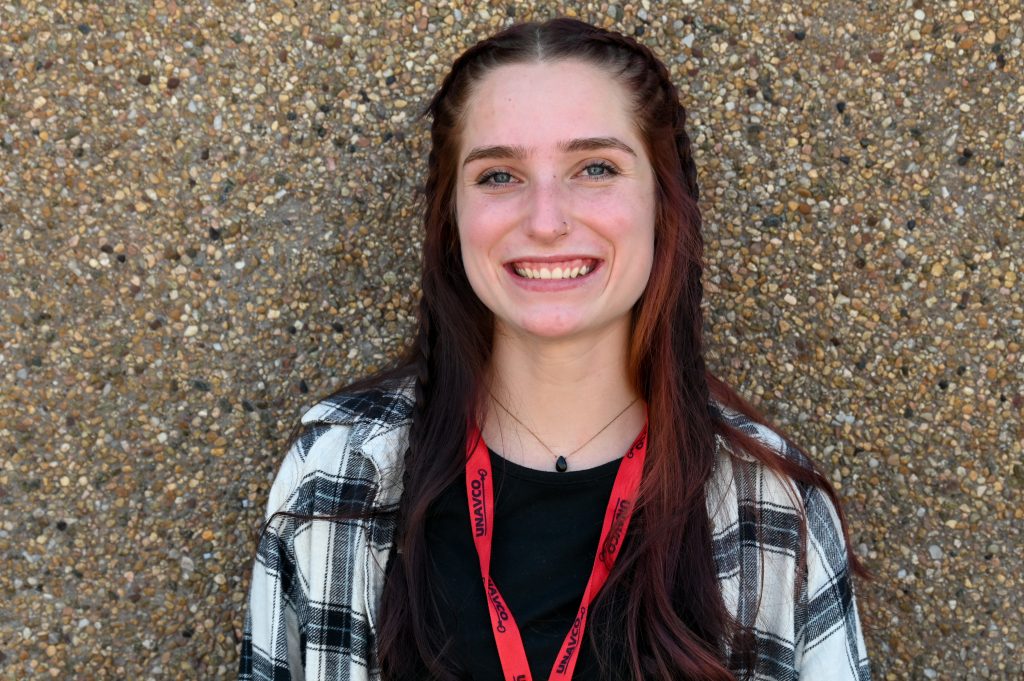
2021 Geo-Launchpad Intern Madalyn Massey 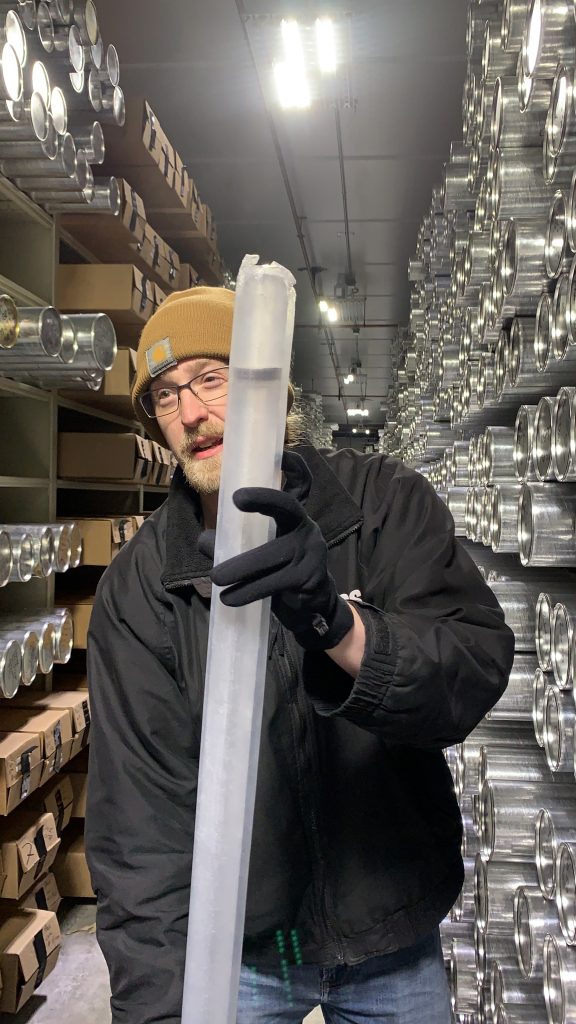
Richard Nunn, NSF Ice Core Facility Assistant Curator, showing the Geo-Launchpad interns an ice core with evidence of a volcanic eruption. (Photo/Madalyn Massey, Geo-Launchpad Intern) 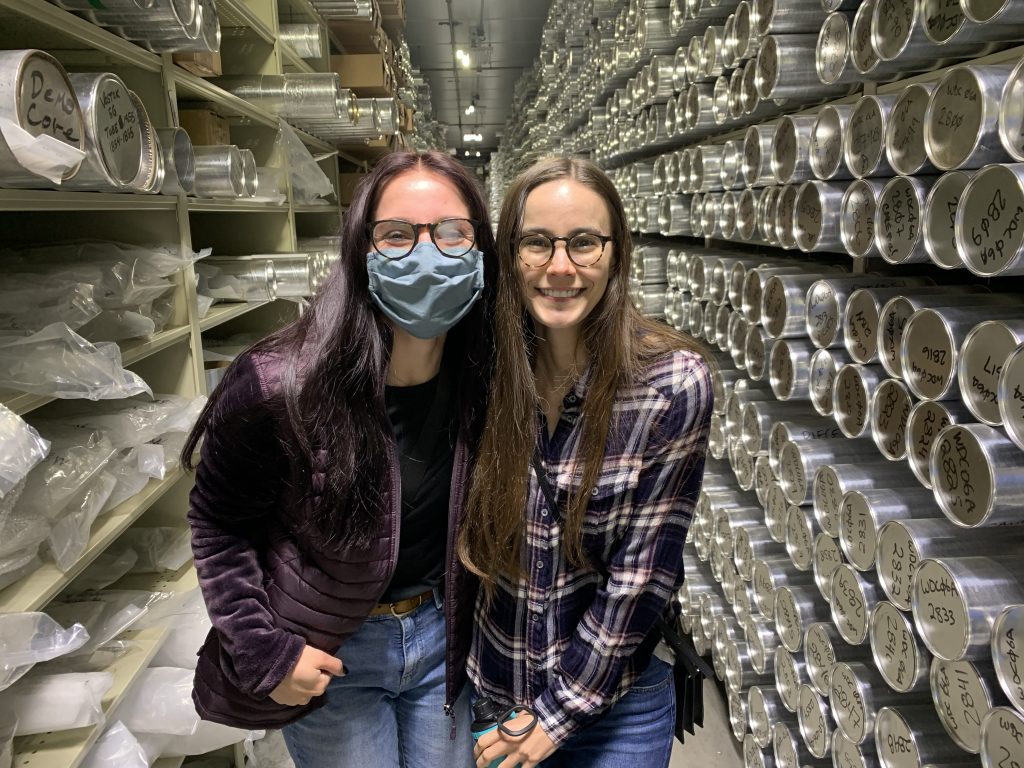
Geo-Launchpad interns Madalyn Massey and Allison Sowers at the NSF Ice Core Facility in Lakewood, CO. 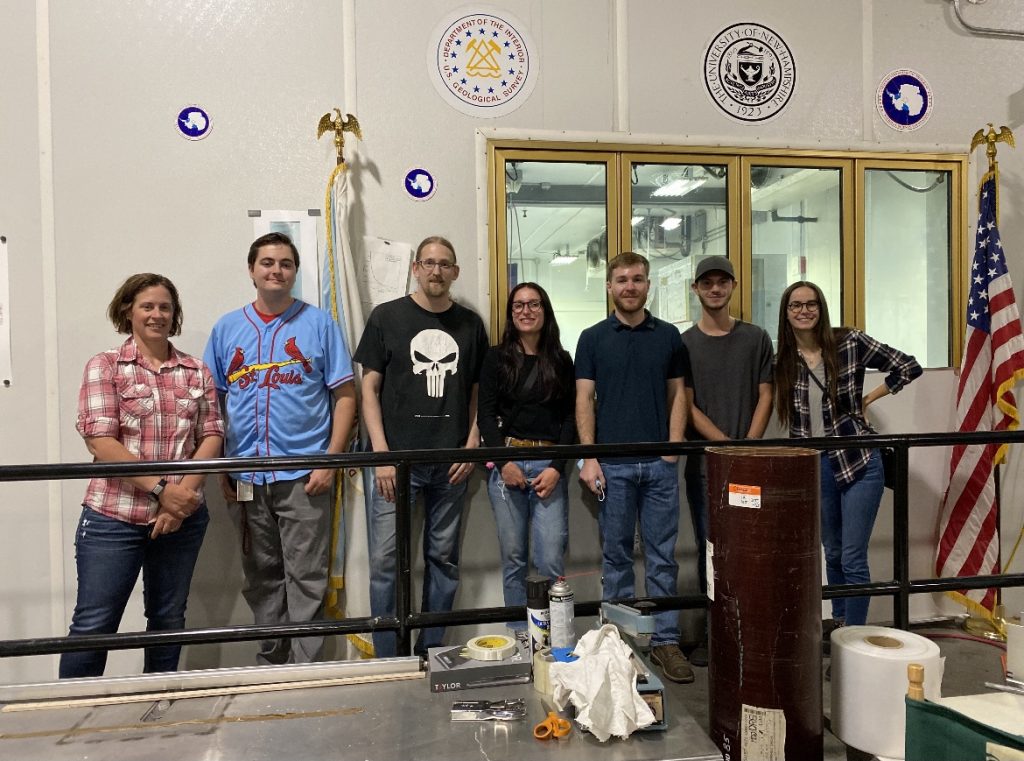
Mentor Mikki Johnson, two NSF Ice Core Facility employees, and the Geo-Launchpad Interns (Madalyn Massey, Patrick Walston, Jimmy Swift, and Allison Sowers) at the NSF Ice Core Facility.
This summer we’re introducing interns in the RESESS and Geo-Launchpad programs to shine a spotlight on the research projects they are completing throughout these 11-week internships and on their interests in geoscience.
Madalyn Massey is a rising junior at Front Range Community College. She began college studying nutrition, but realized that she did not want to pursue the subject as a career. Madalyn had taken an environmental science course that she really enjoyed, and she discovered a Forestry certificate that she would be able to obtain in a few semesters and then immediately enter the industry with. Two of Madalyn’s professors told her about the Geo-Launchpad program and it seemed like a great opportunity for Madalyn, as a first-generation college student, to network and obtain professional development experience. She hoped with the Geo-Launchpad program, she would be able to “catch up” professionally to students who had been involved in geoscience for much longer and build a network of connections.
Patrick Walston just graduated with his associate’s degree from San Juan College and is transferring to Fort Lewis College this fall to earn a bachelor’s degree in geology. Patrick grew up in Bakersfield, CA, where there are large oil fields. From a young age, he knew that he wanted to work in the oil industry, but that he also wanted to receive an education. Patrick completed two years of his undergraduate degree in a geological engineering program, but realized that he was not passionate about engineering. He moved to New Mexico and decided instead to study geology.
Dr. Lindsay Powers, Program Coordinator for the USGS National Geological and Geophysical Data Preservation Program and Director of the Geological Materials Repository, and Michaela (Mikki) Johnson, Assistant Program Coordinator for the USGS National Geological and Geophysical Data Preservation Program, are mentoring Madalyn and Patrick throughout the Geo-Launchpad program this summer.
The first part of Madalyn and Patrick’s project involves a thorough literature review: learning about the range of geological and geophysical materials and data that exist and about the current instructions that are distributed to scientists to describe how materials need to be preserved and curated through the Core Research Center. The next step of the project is to critically evaluate the repository’s collection methods. For this part of the project, Madalyn and Patrick had the opportunity to see the NSF Ice Core Facility in Lakewood, CO.
The final component of the project requires Madalyn and Patrick to document the best practice workflows with regard to preserving and curating each type of geological material, improving upon current protocols. For example, Patrick is completing drill core log digitization protocols, while Madalyn is compiling the methodology for Structure from Motion—virtual, three-dimensional models of rock samples. This last step of their project also allows Patrick and Madalyn to present their revised protocols to scientists from the Core Research Center via virtual webinars. Madalyn and Patrick’s project should maintain quality assurance in the collection of geological data, so that the data is accessible and well-preserved for future scientists.
Q&A
- What has been your favorite part of the Geo-Launchpad program so far?
Madalyn: Probably the first month, being able to be with everybody, especially after COVID. When I was interviewing, [UNAVCO’s Kelsey Russo-Nixon] said how long we would be in-person versus virtual was up in the air, so I was hoping that we got at least a month [in-person]. Definitely a lot of great people in the program. Not just the interns, but the staff as well. It’s a lot different working in-person than virtually. The social aspect of the first month has been really fun, but now working virtually after establishing that relationship, I have full confidence in being able to complete the program. Even though we were only in-person for the first third of the program, I think it was imperative to create that solid foundation of connections so that I could trust and seek support if needed.
Patrick: I really enjoyed spending time in Boulder, and living on the CU Boulder campus. That was a really unique opportunity. Being in Boulder and getting to walk around the town and everything was really cool, especially coming from New Mexico or southwestern Colorado.
- What have you gained from your mentorship with Dr. Powers and Michaela Johnson?
Madalyn: A lot of guidance… We’re all learning everyday. Definitely networking and the confidence to ask questions and try to gain connections and take every opportunity there is.
Patrick: I definitely see a sense of professionalism, and what it’s like to work for the government, for the USGS.
- Have you learned about any new topics or research techniques that have really piqued your interest?
Madalyn: Honestly this project as a whole, not specifically what we are doing, but just supporting science. I think that research is cool, but I also think that this aspect I enjoy more, as far as being the foundation of science… I really like being almost in the background, just being a supporter of science in ways that some people might not even realize…. Just learning about the different practices that are in place for that to happen, such as updating recommended practices on how to collect and properly preserve physical samples in geology alone. I think that there’s a huge community that goes undervalued and underrepresented, as far as supporting science. I think that we wouldn’t be as far as we are today without people doing the dirty work… It’s still super important.
Patrick: Digitization of sample data is interesting because when you put lots of information online, you have to know how to correctly do it. One thing that was interesting to me is the use of persistent identifiers, in which every researcher and every sample have an ID tag that exists uniquely for that object or for that person. So you can just enter that anywhere, and it will lead you right to what you’re looking for, specifically. The use of persistent identifiers and data input and collection management [have interested me].
The Geo-Launchpad program has made Madalyn realize that she no longer wants to pursue a Forestry certificate and instead, she has changed her major to Natural Resources Management for her associate’s of applied science. She hopes that she will be able to go abroad to study environmental science in the future. Learning about the research that RESESS interns, like Samantha Motz, are completing has made Madalyn realize that she wants to explore hydrology further. Ultimately, Madalyn aims to be an environmental scientist and to continue to champion support science.
Other than transferring to Fort Lewis College this fall to study geology, Patrick plans to obtain a GIS certificate. This summer, he is looking forward to going to Disneyland with his family in August and hiking around southwestern Colorado.
Written by:
- Lucia Bellino, USIP Intern
- Posted: 23 July 2021
- Last updated: 23 July 2021
- Tags: data, internships


